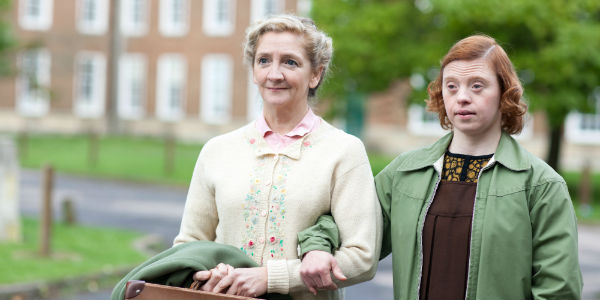For the third season in-a-row, we are honored to have the faculty of the Vanderbilt School of Nursing back to guest blog for us each Monday morning about the previous night’s episode of Call the Midwife, airing on Sundays on NPT and PBS Stations nationwide at 7:00 p.m. Central, March 30-May 18. Check in here every Monday morning for the next eight weeks for historical and contemporary context on the show, and some fun discussion. Plus, this year we’ll have the occasional bonus blog from across the pond to get the British perspective. So be sure to check the blog TWICE on Mondays. SPOILER ALERT: Some posts may contain spoilers, so please be aware of that.
By Michelle Collins PhD, CNM

In keeping with this season’s theme of some very complex content matter, this week was no exception. Contrary to Dr. Turner’s and the midwive’s consternation that the young woman with Down Syndrome (DS) conceived, it is possible for conception to occur in women with DS (albeit their chances are decreased). If they do conceive, they have a high risk (approximately 50%) of having a child with DS, and also have a greater risk of miscarriage. Males with DS, on the other hand, have decreased ability to father children; they are usually sterile.
Not so long ago, society’s approach to individuals with DS (and other intellectual disabilities) was to subject women to nonconsensual sterilization, often including hysterectomy (removal of the uterus). People with DS, as well as those with other intellectual disabilities, have been labeled as somehow asexual and thus “kept in the dark” about sexual health, with the thought being that if they are not taught about sexual health, they will not participate in sexual activity. This is of course a misconception, as individuals with DS are sexual beings, as we all are. Not providing them with education and information about sexuality does not prevent them from engaging in sexual activity. In fact, it increases their risk of being sexually mistreated or abused, particularly if they are not educated, and warned, about the behaviors of those who would prey upon them. A critical aspect of this issue is that people with intellectual disabilities MUST be provided with the knowledge that will enable them to make informed choices about their own reproductive health, and that includes giving them information to assist them in making choices about contraception.
Sister Evangeline’s jubilee also captivated our attention in this episode. For those among us who may not know what a jubilee is, it is the anniversary of when a religious sister, or nun, enters her vocation. The mark can be 25, 50, or however many years of service that the community decides to celebrate. Despite Sister Evangeline’s apparent distaste for all things “jubilee,” the joy and humility she eventually feels at seeing old friends, and embracing those whose births she was a part of, was palpable. Sentiment is a funny thing; some of us shy away from it because to reveal that we have a sentimental side puts us at risk of revealing our real selves, and revealing our real selves opens us up to the possibility that we will be misunderstood, or worse, rejected. As a midwife, I could identify with what Sister Evangeline must’ve felt as the line of those whose births she had been blessed to be part of filed past her. Researchers have noted that one of the most powerful memories that women carry throughout their lives is that of their birth experiences – good or bad. In interviewing elderly women, researchers have been impressed by the depth of detail that women can recall about giving birth. So it is with midwives; but we remember vividly not only the details of our own children’s births, but the births of those we have been so privileged to be part of. Now I won’t try to pretend that we midwives can remember in great detail every single birth we have ever been part of, but there are so many births that touch our hearts along the way. And like Sister Evangeline, we have preciously stored away in our memories the faces of those whose paths we have crossed who have made much more of an impression on us, than we have on them.
Missed our analysis of the Previous Season’s Episodes? Read them here.

2 Comments
I agree that this season seems to be “darker” than previous seasons. Nevertheless, the producers did a nice job in presenting an often marginalized population, those with intellectual disabilities. My heart ached for the teen girl and her beau, both struggling with society’s expectations that they are incapable of being good parents because of their cognitive delays. This episode reiterates how desperately ALL teenagers need reproductive knowledge in vocabulary they can understand. It is unfair for young adults to be excluded from reproductive education simply based on their impairments.
residential epoxy concrete floor coating
`Call the Midwife` Recaps: Season 3: Episode 5 – News and Programming Updates From Nashville Public Television